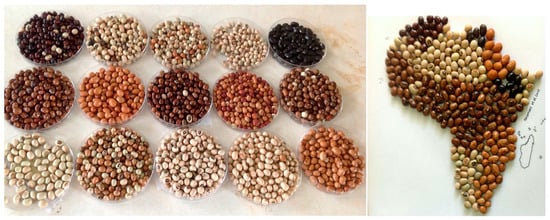- This topic is empty.
- AuthorPosts
- April 8, 2025 at 5:46 am #623884

Akidi beans, also known as African groundnuts or Bambara beans, are a valuable crop for many rural communities in Africa.
These legumes are not only rich in nutrients but also play an important role in food security, offering a sustainable source of protein, carbohydrates, and essential minerals.
Furthermore, Akidi beans are highly adaptable to various climatic conditions, making them a suitable crop for smallholder farmers. Enhancing the production of Akidi beans can significantly contribute to local consumption, improve nutritional status, and generate income for farmers.
By adopting modern agricultural practices, improving processing techniques, and expanding market access, Akidi bean production can be increased to meet both local and regional demands, leading to long-term economic and social benefits.
1. Improving Seed Quality and Access
The first step in enhancing Akidi bean production is ensuring that farmers have access to high-quality seeds. Seed quality directly affects germination rates, crop yields, and disease resistance.
Farmers should be encouraged to use certified seeds from reputable suppliers to ensure they are planting varieties with superior genetic traits, such as higher yields, better drought resistance, and improved pest tolerance.
Additionally, efforts should be made to ensure that seeds are readily accessible and affordable to local farmers. Government support, through seed distribution programs or subsidies, can help make these seeds more available to smallholder farmers. Improving seed quality and access is the foundation for enhancing Akidi bean production and ensuring successful harvests.
2. Implementing Improved Agricultural Practices
Adopting modern farming techniques can significantly increase Akidi bean yields and reduce production costs. This includes practicing proper soil preparation, efficient use of fertilizers, and employing crop rotation strategies to maintain soil fertility.
Akidi beans are nitrogen-fixing plants, which means they can improve soil health by enriching the soil with nitrogen. However, farmers should still be encouraged to apply organic or chemical fertilizers based on soil tests to address any nutrient deficiencies.
Additionally, proper irrigation methods should be implemented, especially in areas with unreliable rainfall. Drip irrigation or rainwater harvesting can be used to ensure consistent moisture levels, promoting healthy plant growth and improving yields.
Implementing these improved agricultural practices will not only boost production but also help farmers achieve more sustainable farming systems.
3. Enhancing Post-Harvest Handling and Storage
Post-harvest handling is critical to preserving the quality of Akidi beans and reducing losses that may occur after harvest. Proper drying, cleaning, and storage techniques can significantly improve the shelf life of the beans and prevent contamination from pests or mold.
Farmers should be trained in proper drying methods to reduce moisture content to safe levels, which helps to prevent the growth of fungi or bacteria that could cause spoilage. Furthermore, the use of sealed storage containers or silos can protect the beans from pests and environmental factors such as humidity and temperature fluctuations.
Establishing local storage facilities could also allow farmers to sell their beans when market prices are more favorable, ensuring better income. Enhanced post-harvest handling and storage practices are essential for maximizing the market value of Akidi beans and reducing losses.
4. Expanding Market Access and Value-Added Products
For Akidi beans to contribute significantly to income generation, farmers must have access to reliable and profitable markets. Creating linkages between producers and buyers, such as local processors, traders, and supermarkets, will help farmers find consistent markets for their beans.
Additionally, promoting the development of value-added products, such as Akidi bean flour, snacks, or oil, can increase the market value of the beans and create new revenue streams for farmers.
Local processing facilities can be established to reduce the reliance on external markets and offer farmers the opportunity to sell processed products at higher prices.
Expanding market access and developing value-added products can significantly enhance the economic potential of Akidi bean production, benefiting both farmers and consumers.
5. Promoting Awareness and Farmer Education
To enhance Akidi bean production, it is essential to educate farmers about the benefits and best practices for growing the crop.
Agricultural extension services should provide training on seed selection, pest management, irrigation, and soil fertility management.
In addition, creating awareness about the nutritional value of Akidi beans can encourage local consumption, increasing domestic demand. Farmers can also benefit from learning about new markets, processing techniques, and government policies that support bean production.
Encouraging farmer cooperatives or associations can also strengthen the collective bargaining power of farmers, ensuring better prices and access to resources. Promoting awareness and education will empower farmers to adopt best practices, increase productivity, and maximize the potential of Akidi bean production.
In conclusion, enhancing Akidi bean production for local consumption and income generation is a viable strategy for improving food security and boosting the livelihoods of farmers.
By focusing on improving seed quality, implementing modern agricultural practices, enhancing post-harvest handling, expanding market access, and promoting farmer education, the production of Akidi beans can be optimized.
This will not only increase local consumption and nutrition but also contribute to the economic empowerment of smallholder farmers. Through collaborative efforts between governments, NGOs, and the private sector, Akidi bean production can be transformed into a profitable and sustainable industry that supports rural development and enhances food security across regions.
Read Also: Unlocking the Health Benefits of Akidi: A Nutritional Powerhouse
- AuthorPosts
- You must be logged in to reply to this topic.

